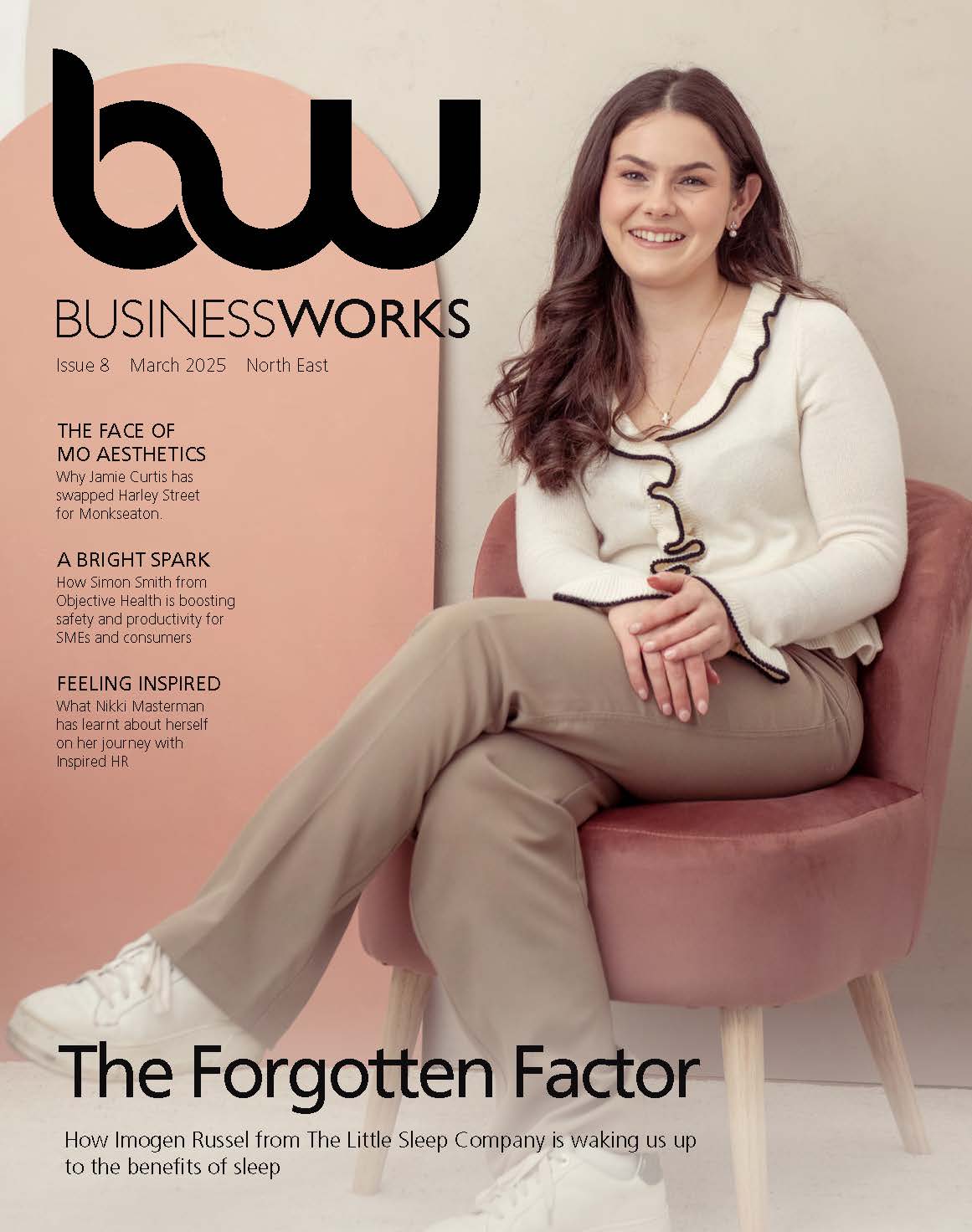Since 2014, the trailblazing Business Clinic at Northumbria University has provided pro-bono consultancy work to hundreds of companies and organisations. The benefits have not only helped level the playing field for students but provided a fresh perspective on business challenges. Alison Cowie asks its founder, Nigel Coates, why the initiative has been such a success.
University Business Schools have long been teaching facts and models to students in lecture theatres, while practical real-work experience has come via work placements.
But getting the best placements hasn’t always been an equal playing field, with students often relying on parents’ established networks and connections to secure prized experience in sought-after companies.
This quandary led Associate Professor Nigel Coates to establish the Business Clinic at Northumbria University in 2014.
He explains: “We wanted to create something that would enable students who didn’t have the contacts through their own personal networks or that of their families to get a better insight into business.”
The initial aim of the Business Clinic was to provide an environment where Newcastle Business School students could work directly with a client on a real world business challenge.
Ten years on and it has delivered 780 consultancy projects involving more than 3100 students.
Business School Students work at the Clinic in their final year of study, offering clients a full pro bono consultancy service. Projects include feasibility studies in finance, investment and growth; branding and marketing; business analytics and logistics, and more.
At the end, students present their findings and short and long-term recommendations to clients.
Not only has the trailblazing initiative helped students gain quality real-world business experience, no matter their background, but as Nigel reveals, it has also helped to open up new sectors to participants, particularly those previously seen as male-dominated.
“The projects have helped to break down lots of different barriers,” Nigel adds.
The Business Clinic has garnered much attention and numerous accolades over the years. Most recently it won a Small Business Charter Excellence Award.
Nigel did Business Studies at university in the 1980s, completing a placement as part of his degree.
After graduating, he moved to the Isle of Man to work as a business manager in a small startup computer company. But while the 23 year old enjoyed his job, the gentile island lifestyle wasn’t conducive and he relocated to the North East to take a marketing position at a large manufacturer in Sunderland.
A move to be a commercial manager at a small yet successful company that monitored corrosion for the oil and gas industry followed.
It was during this latter role that Nigel was approached to do some part-time lecturing at what was then North Tyneside College.
He recalls: “The college asked if I would run a City and Guilds for owners of small hotels and guesthouses. I said yes and taught everything apart from the cooking!”
Nigel says the experience gave him “the bug for teaching and learning” and he took a full-time lecturer position at Northumbria University in 1988.
Despite his career change, Nigel maintained strong links with industry, which informed his teaching style.
He organised several knowledge transfer partnership schemes with local companies, which proved pivotal in the later evolution of the Business Clinic.
The main catalyst for the Business Clinic, however, came when Northumbria University merged its Business School and its Law School into a Faculty.
Nigel explains: “After the two merged, the Executive Dean asked what the Business School was doing that was the equivalent to the Student Law Office. At the time, we weren’t doing anything similar, so that’s why we started the Business Clinic.”
In its first year, the Clinic provided 20 undergraduate students with a year-long consultancy experience that would be in place of their dissertations. They worked in groups of 4 with a client who asked them to come up with solutions to a real life business challenge.
Nigel also encouraged the students to keep a learning journal to help them identify skills and anecdotes that would differentiate them in job interviews once they graduated.
“I’d previously sat in on interviews where you could see the graduates knew the facts they’d learnt from textbooks but they were missing those practical examples,” the Associate Professor adds.
The pilot project proved an overwhelming success and while it was initially meant for students who hadn’t secured a placement, more and more business school students soon wanted to get involved.
“They could see the value in getting involved and working with clients at a strategic level,” Nigel adds.
Within a few years, Northumbria University decided to invest in the Business Clinic by providing it with purpose-built facilities.
“We designed the space to be more like a work environment than an education one, with private meeting spaces and its own entrance so that students could greet clients as they came in.”
Since 2014, Nigel and the Business Clinic have attracted a diverse range of businesses including micro-businesses, SMEs, multi-national organisations, charitable organisations, educational trusts, social enterprises and public sector organisations.
The Clinic now has a full-time business clinic manager who brings in around 100 projects a year, while students are guided by a team of tutors who specialise in all aspects of business.
Its founder reveals: “We began working with Nissan after one of its regional managers – who was a former student of the Business Clinic – recommended us.”
Nigel knows the projects he is offering to students represent a different way of learning.
“There’s no one right answer when it comes to working in the Business Clinic. The tutors will offer advice on potential pitfalls, but students need to work with each other, conduct research and come up with solutions that demonstrate impact and value.”
The Business Clinic’s aim to better prepare students for the world of work seems to be working, as its founder explains.
“We ask students to complete a survey before and after the course about where they see themselves in terms of employability. We see things like resilience, which we know is highly valued by employers, shooting up as they’ve had the experience of working directly with clients.”
Meanwhile, the Clinic is also proving to be a fertile environment for budding entrepreneurs with 86% of Business Clinic participants placing themselves in the top two categories for having ‘an entrepreneurial mindset’ at the end of the course.
The key to the Business Clinic’s success, though, is that the initiative doesn’t just benefit students. There are also considerable benefits for businesses to get involved.
Nigel explains: “The advice we give is free of charge, which is obviously a benefit, but clients also get a lot of creativity, a fresh set of eyes and a different perspective.
“Students can also be brutally honest and clients appreciate that. It’s why many come back the next year.”
Nigel is proud of how the Business Clinic has developed over the last 10 years and sees it as an important part of the North East business support ecosystem.
“The real buzz is about having a positive impact that goes beyond the students. You can see the effect we’re having on the businesses and the charitable organisations – some of which don’t have the finances or the time to get the consultancy support we offer.
“It feels like we are putting something back into the economy and into society.”
The success of the Business Clinic at Newcastle Business School means Nigel is now advising numerous other universities on how to set up similar initiatives, including Sheffield Hallam, Birmingham City, Liverpool John Moores, Leeds Beckett, Sunderland, York St John, Durham and even Deakin University in Australia.
In terms of the Business Clinic at Northumbria, Nigel is keen to expand the initiative to students beyond the Business School. This process has already started with
business students partnering with film students on several projects last year to deliver promotional materials for the RNLI and for South Tyneside Council.
“We want to continue to engage students in other areas of the university as developing more interdisciplinary teams is something that you are increasingly seeing in the real world,” Nigel adds.
It seems the Business Clinic is a win-win for everyone. Here’s to the next 10 years!
For more information, visit https://www.northumbria.ac.uk/business-services/engage-with-us/talent-and-insight/the-business-clinic/






